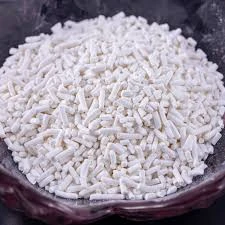
sodium benzoate and potassium sorbate
Understanding Sodium Benzoate and Potassium Sorbate Preservatives in the Food Industry
In the world of food preservation, two commonly used chemical compounds are sodium benzoate and potassium sorbate. Both are widely employed in the food and beverage industry to extend shelf life, prevent spoilage, and maintain product quality. While both serve a similar purpose, they have distinct properties, applications, and regulatory considerations that make them unique.
Sodium Benzoate An Overview
Sodium benzoate is the sodium salt of benzoic acid, a naturally occurring compound found in various fruits such as cranberries and prunes. As a food preservative, sodium benzoate is most effective in acidic environments, with optimal activity occurring at a pH of 4.5 or lower. This feature makes it particularly useful in preserving acidic foods and beverages like soft drinks, fruit juices, and pickles.
When sodium benzoate is added to food, it prevents the growth of harmful microorganisms, particularly yeasts and molds, which can spoil food products. Its effectiveness as a preservative is well-documented, and it has been classified as Generally Recognized as Safe (GRAS) by the U.S. Food and Drug Administration (FDA). However, it is essential to note that, in large quantities, sodium benzoate can produce benzene, a known carcinogen, when exposed to high levels of heat and light in the presence of ascorbic acid (vitamin C). Hence, regulatory agencies monitor its usage in food products.
Potassium Sorbate A Versatile Preservative
sodium benzoate and potassium sorbate

Potassium sorbate, on the other hand, is the potassium salt of sorbic acid, a compound that naturally occurs in some berries. Like sodium benzoate, potassium sorbate is used to inhibit the growth of molds, yeast, and bacteria, making it invaluable for a broad range of food products. Its versatility allows it to be used in dairy products, baked goods, and even personal care items.
One of the notable advantages of potassium sorbate is its effectiveness across a wider pH range compared to sodium benzoate, making it suitable for use in less acidic environments. Its low toxicity and the absence of detrimental interactions with other food constituents contribute to its popularity among food manufacturers. Regulatory bodies around the world, including the FDA and the European Food Safety Authority (EFSA), have deemed potassium sorbate safe for consumption when used within recommended limits.
Regulatory Perspectives and Consumer Awareness
While sodium benzoate and potassium sorbate are both approved as food additives, consumers are increasingly conscious of the ingredients in their food. There has been a growing trend toward natural preservatives, and many food manufacturers are re-evaluating their preservative choices in response to consumer demand for transparency and health-conscious options. This shift is prompting companies to explore alternatives that are derived from natural sources, which can present challenges in balancing product stability and shelf life.
In conclusion, sodium benzoate and potassium sorbate play crucial roles in food preservation, helping to ensure that products remain safe and palatable over time. Both have established safety profiles and are considered effective in controlling microbial growth. However, as consumer preferences evolve, manufacturers must navigate the complexities of food safety, regulatory compliance, and the growing demand for cleaner labels. Understanding the properties and applications of these preservatives will continue to be essential for both industry professionals and consumers alike.
-
Pure Sodium Dichloroisocyanurate Dihydrate | Powerful DisinfectantNewsAug.29,2025
-
Industrial Chemicals: Quality & Purity for Every IndustryNewsAug.28,2025
-
Nitrile Rubber Honoring Strict Production StandardsNewsAug.22,2025
-
Aspartame Ingredients Honoring Food Safety ValuesNewsAug.22,2025
-
Fertilizer for Balanced Plant NutritionNewsAug.22,2025
-
Cyanide Gold Processing with High Purity AdditivesNewsAug.22,2025
-
Formic Acid in Textile Dyeing ApplicationsNewsAug.22,2025
Hebei Tenger Chemical Technology Co., Ltd. focuses on the chemical industry and is committed to the export service of chemical raw materials.
-

view more DiethanolisopropanolamineIn the ever-growing field of chemical solutions, diethanolisopropanolamine (DEIPA) stands out as a versatile and important compound. Due to its unique chemical structure and properties, DEIPA is of interest to various industries including construction, personal care, and agriculture. -

view more TriisopropanolamineTriisopropanolamine (TIPA) alkanol amine substance, is a kind of alcohol amine compound with amino and alcohol hydroxyl, and because of its molecules contains both amino and hydroxyl. -

view more Tetramethyl Thiuram DisulfideTetramethyl thiuram disulfide, also known as TMTD, is a white to light-yellow powder with a distinct sulfur-like odor. It is soluble in organic solvents such as benzene, acetone, and ethyl acetate, making it highly versatile for use in different formulations. TMTD is known for its excellent vulcanization acceleration properties, which makes it a key ingredient in the production of rubber products. Additionally, it acts as an effective fungicide and bactericide, making it valuable in agricultural applications. Its high purity and stability ensure consistent performance, making it a preferred choice for manufacturers across various industries.





